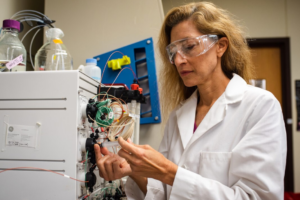Republicans often get branded as “climate-change deniers.” Most don’t deny natural climate change, but many do question the extent of human responsibility for present-day warming and of threatened catastrophic effects.
By contrast, Democrats often get labeled as “climate solution deniers.” Democrats propose to get off fossil fuels and switch to renewables as fast as possible — although, unfortunately, neither of these things will have much impact on climate change.
The typical policy proposed to force a rapid energy transition is a price on carbon: taxes. The problem is that taxes don’t reduce global emissions because a price on carbon won’t be imposed globally.
Instead, carbon pricing increases the cost of products locally, makes them less competitive globally, and shifts manufacturing and jobs to other countries, like China, that have lower emissions standards. From 2007 to 2017, CO2 emissions in China increased by 28 percent, whereas they decreased by 14 percent in the United States.
In fact, the U.S. is two-thirds of the way toward its Paris Agreement power emissions target — without a Clean Power Plan or carbon pricing — thanks to cheap natural gas replacing coal in power generation; the growth of renewables; some efficiency gains; and, of course, manufacturing shifting overseas to China.
The scale of global energy consumption, mining and manufacturing is simply too vast to be powered by renewable energy soon enough to matter for the climate, even if we could afford it. No amount of political will can overcome this reality. The concept of “zero emissions” is also disingenuous.
Just because your car, food, clothes, electronics, steel, gasoline and electricity are made somewhere else does not mean you are “clean,” for “somewhere else” has emissions — and often worse.
Finally, although the wind and sun are renewable sources, the stuff required to collect their energy is not. Wind turbines, solar panels and batteries require extensive mining, manufacturing, transmission, land use and landfill disposal. Is this “green”?
While Democrats and Republicans play politics with climate and energy, many voters remain concerned about climate change and seek real solutions. How do we actually reduce global CO2 emissions at the scale and in the time frame needed to avoid catastrophic climate change? We can start by listening to the energy experts, who know that a one-size energy solution does not fit all, and that each nation must focus on the things it can afford given its specific resources, political structure, economic reality and existing infrastructure.
When it comes to electricity, dense cities need dense power, such as natural gas — and in some places coal — generation with carbon capture and storage, nuclear, hydro and industrial-scale wind. For rural areas, a good solution is distributed renewable energy — including solar, wind and geothermal — along with small, modular nuclear and natural gas reactors to back up these sources.
For transportation, electric vehicles make sense in cities, but let’s end the subsidies to buy them, which go mostly to the wealthy. Combustion engines can be designed to get much better mileage, reducing emissions significantly, especially in rural areas.
Most importantly, efficiency across all sectors, made possible by nonpartisan energy education and government incentives, can substantially reduce energy consumption and emissions without diminishing quality of life.
In addition to significantly reducing global emissions, these approaches are beneficial because they also will provide affordable, safe and reliable energy to the billion people in the world living with no electricity, as well as to the 2.5 billion cooking inside over wood, coal and dung fires. Energy access not only provides housing, clothing, food and transportation to those in energy poverty, but also improves education and health care, which lowers birth rates.
Now is the time to put the partisan, climate–energy rhetoric and political posturing aside, listen to the energy experts, and do the things that will have a positive impact on the environment, climate and poverty.
Scott Tinker is the director of the Bureau of Economic Geology and a professor at The University of Texas at Austin.
A version of this op-ed appeared in The Hill.




